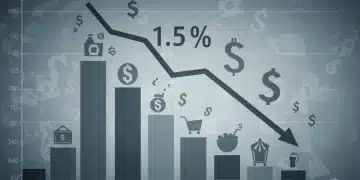Inflation impact on household expenses: what to expect

The inflation impact on household expenses leads to rising costs for goods and services, necessitating budget adjustments and proactive financial strategies to manage essential spending effectively.
Inflation impact on household expenses has become a hot topic, especially for families trying to stay afloat. Have you noticed your grocery bills climbing? You’re not alone, and it’s worth exploring what’s really happening.
Understanding inflation and its causes
Understanding inflation is crucial for grasping how it influences household expenses. It’s not just about rising prices; it reflects changes in the economy. In this section, we’ll break down what inflation is and explore its causes in simple terms.
What is Inflation?
Inflation occurs when the general price level of goods and services rises, leading to a decrease in purchasing power. This means that over time, your money buys less than it used to. Understanding this concept is vital for effective budgeting.
Key Causes of Inflation
Several factors can lead to inflation. Recognizing these helps you anticipate changes in your expenses. Here are some primary causes:
- Demand-Pull Inflation: This happens when demand for goods and services exceeds supply, causing prices to rise.
- Cost-Push Inflation: When the costs of producing goods increase, companies often pass these costs onto consumers.
- Built-In Inflation: Workers demand higher wages to keep up with rising costs, leading companies to increase prices further.
- Monetary Policy: Central banks can influence inflation by changing interest rates, which affects spending and borrowing.
As you can see, inflation is affected by multiple interconnected factors. When demand spikes, or when production costs rise, it puts pressure on prices, resulting in inflation. It’s also important to realize how these factors may impact your day-to-day expenses.
With a clearer view of inflation and its causes, you’ll be better equipped to navigate changes in your budget and spending habits. Always keep an eye on economic trends, as they provide essential insights into potential fluctuations in the market.
How inflation affects everyday expenses

Inflation significantly impacts our everyday expenses, affecting how much we spend on basic necessities. When prices rise, it can change our shopping habits and influence our budgets. Understanding this effect is essential for making informed financial decisions.
Rising Costs of Goods
One of the most noticeable ways inflation affects us is through the increasing prices of goods. For example, food, clothing, and household items can become more expensive. You might have noticed that your usual groceries now cost more than they did last year. This rise in prices means you may need to adjust your spending to cope with the changes.
Impact on Utilities and Services
Inflation also impacts your monthly utility bills and various services. As the cost of energy and other services goes up, your regular expenses can take a bigger chunk of your budget. Here are some common areas affected:
- Electricity and Gas: Higher energy prices can lead to steeper electricity and heating bills.
- Transportation: Rising fuel prices influence transportation costs, affecting both commuting and travel.
- Healthcare: Medical services and prescription costs can increase, making healthcare less affordable.
- Housing: As inflation affects construction costs, rents and property prices may rise.
These factors combine to make managing your household expenses more challenging. You may start to feel the pinch in other areas as a response to rising costs.
Furthermore, inflation often leads to wage adjustments as employers try to keep up with the cost of living. However, these adjustments may not always keep pace with inflation. If your salary rises but not enough to cover increased costs, you might find it harder to maintain your lifestyle.
It’s important to track your spending and budget accordingly, especially during times of inflation. By being proactive, you can better navigate the financial challenges that arise when prices soar.
Practical ways to manage rising costs
As inflation continues to impact your budget, it’s crucial to find practical ways to manage rising costs. Developing strategies can help you maintain control over your finances. Simple adjustments can lead to significant savings and help you adapt to changes in the economy.
Budgeting Wisely
The first step in managing rising costs is to establish a clear budget. By tracking your income and expenses, you gain insight into where your money goes. You can prioritize essential expenses like groceries, rent, and utilities while minimizing non-essential spending.
Smart Shopping Tips
Another effective way to combat higher prices is to adopt smart shopping habits. Here are a few strategies to consider:
- Buy in Bulk: Purchasing items in larger quantities can often lead to lower prices per unit, especially for non-perishable goods.
- Use Coupons and Discounts: Take advantage of coupons, loyalty programs, and seasonal sales.
- Plan Meals: Preparing a meal plan can reduce impulsive purchases and help you stick to your grocery budget.
- Compare Prices: Use apps or websites to compare prices at different stores before shopping.
Implementing these tips can make a noticeable difference in your monthly expenses.
In addition to shopping smarter, consider reevaluating your subscriptions and memberships. Many households may have services that are underused or no longer necessary. Canceling unused subscriptions can free up funds for essential needs.
Avoiding debt is another key strategy. When possible, pay for purchases with cash or debit instead of relying on credit cards. This helps you stay within your budget and avoid accumulating high-interest debt, making it easier to manage rising costs.
Staying informed about economic trends also plays a role in managing expenses. Understanding how inflation affects prices can help you make proactive decisions about your finances.
Future outlook: Inflation trends and household budgeting

Looking ahead, understanding inflation trends is essential for effective household budgeting. Changes in the economy can greatly impact how families plan their finances. By staying informed, you can better prepare for future expenses and maintain control over your budget.
The Current State of Inflation
Currently, inflation rates are fluctuating due to various economic factors. External events, such as changes in global supply chains and energy prices, can drive costs up or down. It is essential to monitor these trends as they can directly affect your grocery bills, rent, and other essential expenses.
Adapting Your Budget
As inflation trends evolve, your budget must also adapt. Here are some methods to ensure your household finances remain stable:
- Revisit Your Budget Regularly: Make it a habit to review your budget monthly. This helps identify areas where you can cut costs or save more.
- Set Up an Emergency Fund: Having savings for unexpected expenses can help you handle rising costs without going into debt.
- Prioritize Essentials: Focus your spending on necessary items first before allocating money for wants.
- Stay Informed: Keep an eye on economic news. Understanding inflationary pressures can help you forecast changes in your expenses.
As the economy changes, more families are incorporating flexible spending plans. For instance, many choose to adjust their discretionary budgets based on current inflation rates. This allows for dynamic financial planning, aligning spending with present conditions.
Moreover, learning to live within your means is crucial. This may involve downsizing or seeking alternatives for high-cost items. Small adjustments can lead to significant savings over time, ensuring your family’s financial health in uncertain times.
With the right strategies in place, you can navigate inflationary periods without sacrificing essential living standards. Creating a sustainable and adaptable budget enables households to face future uncertainties confidently.
FAQ – Frequently Asked Questions about Inflation and Household Budgeting
How does inflation impact my household budget?
Inflation increases the prices of goods and services, which can lead to higher living costs, requiring adjustments in your budget.
What strategies can I use to manage rising costs?
You can track your expenses, review your budget regularly, shop smartly, build an emergency fund, and prioritize essential purchases.
Why is it important to stay informed about inflation trends?
Staying informed helps you anticipate changes in costs, allowing you to make proactive adjustments to your financial plans.
How can I save money during inflationary periods?
Consider buying in bulk, using coupons, comparing prices, and eliminating unnecessary subscriptions to save on everyday expenses.





